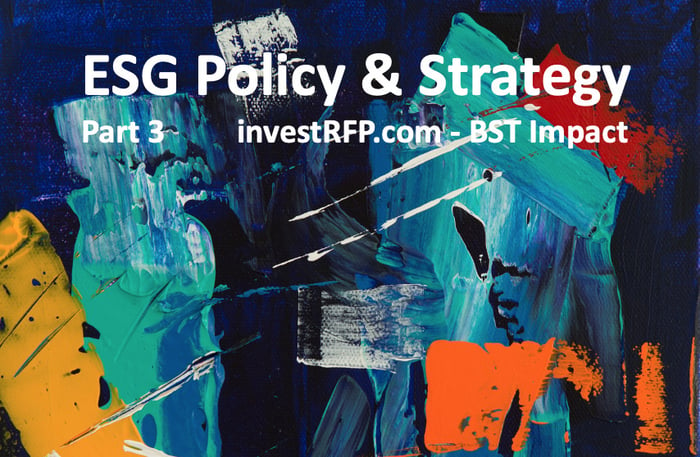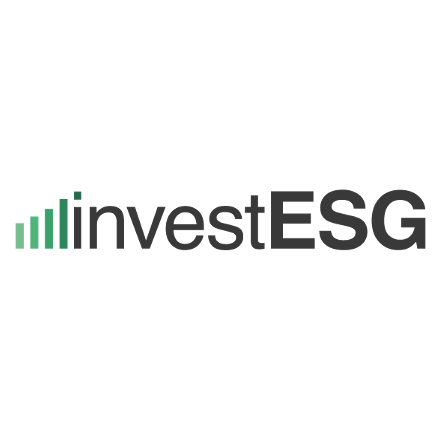

© Steve Johnson
By Kristina Touzenis, Managing Partner BST-Impact Green vs. Sustainable There is also a heightened awareness as to what ESG actually has to be understood as, when read in context - that when we speak about ESG it has to be understood in the sense of the SDGs: that is at 360 degrees. It is not enough to focus on the environment and think that an investment is sustainable "simply” - in quotation marks - because it is "Green" - one has to consider also the effects on the societal levels too.Investments on environmental projects in energy. for instance , often do not report on the potential positive effects that they have the societal, but they do also not necessarily weigh in the potential negative effects. An example could be an investor or asset manager who is focusing on investing in solar panels but is not considering how do solar panels have been produced, whether or not labour conditions live up to International standards or whether the workforce is being exploited.Another thing could be focusing on clean water; in this case very often in reporting and decision making, the investor/asset manager would focus inly on the SDG on water and not consider the positive “spill-over” effects such as: if you have clean water if you live in a rural area for instance the crops will be healthier and your livelihood will be positively impacted; if you have clean water you will have better health - and for children for instance if they have better health they attend school, and this in turn has long-term consequences on their ability to find jobs, to make informed choices and to participate in society. ESG & International LawAll of these issues are a right in international law: the right to water within the right to a decent standard of living; the right to education; the right to an environment in which you are able to search for adequate employment; the right to participation; so these could be very positive spillover effect of an investment in clean water which today are rarely captured.Measuring potential negative consequences could be if you are focusing on hydro energy and building a dam which will provide clean energy for let's say two million people in a certain area but you have to displace 350,000 from their homes and from the current livelihood. Does this mean that you are prevented from building the damn? No, not necessarily but there is a need to put certain measures in place: Relocation plans which respect the rights and the interests of the people who will be relocated and prevent them from suffering displacement for instance. Human Rights Due Diligence RequirementsImportantly the disclosure will not only be on financial products labelled "impact" or "sustainable" but mainstreamed. This is closely linked, but also distinct, from the upcoming Human Rights Due Diligence Requirements for companies operating in, or out of Europe.Investors will by now be required to be able not necessarily to answer all questions, but to be able to understand the effects on sustainability of the investments and at least ask the right questions of the investees – and the same goes for asset owners of their asset managers.One option could seem, for investors as asset managers, to pull out of any investment which may be complex, in a complex sector or in a complex geographical area. However from both an investments perspective, as well as from a sustainability perspective that would be a mistake. It would narrow down investment portfolios to a range of products which would harm many asset managers, and it would have an adverse effect if we want to further sustainability – which at the end of the day is the goal of the EU Regulations.The first step in both being ready, and in taking steps to follow these regulations has to be transparency and engagement. But this requires real sustainability experience and sustainability professionals to assist in preparations, due diligence, reporting, and engagement with investees, communities and the EU institutions.This is closely linked to the Human Rights Due Diligence requirements which are being drafted. On 29th April 2020 the European Commissioner for Justice announced that the EU Commission plans to submit a formal legislative proposal by 2021 (expected to come into force by early 2022) requiring businesses to carry out mandatory due diligence in relation to the potential human rights and environmental impacts of their own operations and value chains.On 26th October 2020, the EU Commission launched a public consultation on a possible initiative on sustainable corporate governance, after the European Parliament had proactively published its own draft text and recommendations for an EU Directive on corporate due diligence, which may indicate the position that it will adopt in response to the future proposal of the Commission.In line with the EU Commissioner’s statement, the recommendations of the European Parliament and the ongoing consultations, it is likely that the UNGPs will be taken as guidance in the definition of the scope of the HRDD obligations.The mandatory due diligence duty, expected to be a legal standard of care, will therefore likely be enshrined in a cross-sectoral regulatory measure, applicable also to SMEs (although with ad hoc treatment), and requiring not only EU based companies, but all EU operating companies to identify, prevent, and mitigate adverse human rights and environmental impacts on their entire upstream and downstream value chain, even if such impacts do not take place within EU borders.It further seems likely that any future HRDD would apply to all human rights and cover all violations regardless of their severity – thereby avoiding legal uncertainties and the artificial separation of human rights – as well as provide for additional measures for vulnerable groups based on current human rights treaties and instruments such as CEDAW, CRC, CRPD and UNDRIP. Working towards the SDGsMost reports coming out from investment institutions and asset managers these days mention that these entities "work towards the SDGs" - but if thus on the basis of National Labor legislation, for instance, that is simply not necessary nearly enough. Could mean only that the invitees are not criminals – yes good! But what you really want to look at is the international legal framework! This makes your goals and ESG reporting very concrete.What does international law mean to us as individuals? Think of the right to food, the right to health, the protection from criminal actions such as kidnapping and murder from others, employment rights such as minimum wages and maximum hours as well as being free from beatings from your supervisor. Getting concrete, no? This does not mean that e.g. wages are the same all over the world but a minimum wage need to be adapted to the context, your investee may very well save money on outsourcing or having a supply chain in countries that are cheaper but that does not mean that they should allow for the industry to exploit that labor.The right to health guarantees all of us that we can obtain healthcare both to prevent as well as to remedy when we are sick. To most investees and as well as investors and asset managers this will seem far-fetched for them unless they are actually working in the healthcare sector - but the fact is that you can very easily work towards the SDG on health if you invest in someone who operates where access to healthcare is not guaranteed: ask them to have a doctor coming to their factory or place of business to do a health check-up for the workforce. You can measure what has been done as an investor - you can measure what that industry did and you can measure progress on medium and long-term basis - this is something that can go directly into your report on your sustainability efforts! This article is the Part 3 of a series on "ESG Policy & Strategy"Part 1: Why asset owners need a good sustainable investment policy and strategy?Part 2: SFDR aims at preventing greenwashing and ensuring data comparabilityPart 3: Working towards the SDGs - at 360 degreesPart 4: Due Diligence, Supervision and Enforcement MechanismsPart 5: Bringing down to "Earth"Part 6: Private ImpactPart 7: ESG as a real sustainability toolPart 8: Awareness and attention towards rights and starndardsPart 9: Cyclical ProcessPart 10: ESG Policy & Strategy – Key QuestionsExpert/Specialist Feedback on investRFP | Kristina Touzenis | BST-Impact
This article is the Part 3 of a series on "ESG Policy & Strategy"Part 1: Why asset owners need a good sustainable investment policy and strategy?Part 2: SFDR aims at preventing greenwashing and ensuring data comparabilityPart 3: Working towards the SDGs - at 360 degreesPart 4: Due Diligence, Supervision and Enforcement MechanismsPart 5: Bringing down to "Earth"Part 6: Private ImpactPart 7: ESG as a real sustainability toolPart 8: Awareness and attention towards rights and starndardsPart 9: Cyclical ProcessPart 10: ESG Policy & Strategy – Key QuestionsExpert/Specialist Feedback on investRFP | Kristina Touzenis | BST-Impact
 This article is the Part 3 of a series on "ESG Policy & Strategy"Part 1: Why asset owners need a good sustainable investment policy and strategy?Part 2: SFDR aims at preventing greenwashing and ensuring data comparabilityPart 3: Working towards the SDGs - at 360 degreesPart 4: Due Diligence, Supervision and Enforcement MechanismsPart 5: Bringing down to "Earth"Part 6: Private ImpactPart 7: ESG as a real sustainability toolPart 8: Awareness and attention towards rights and starndardsPart 9: Cyclical ProcessPart 10: ESG Policy & Strategy – Key QuestionsExpert/Specialist Feedback on investRFP | Kristina Touzenis | BST-Impact
This article is the Part 3 of a series on "ESG Policy & Strategy"Part 1: Why asset owners need a good sustainable investment policy and strategy?Part 2: SFDR aims at preventing greenwashing and ensuring data comparabilityPart 3: Working towards the SDGs - at 360 degreesPart 4: Due Diligence, Supervision and Enforcement MechanismsPart 5: Bringing down to "Earth"Part 6: Private ImpactPart 7: ESG as a real sustainability toolPart 8: Awareness and attention towards rights and starndardsPart 9: Cyclical ProcessPart 10: ESG Policy & Strategy – Key QuestionsExpert/Specialist Feedback on investRFP | Kristina Touzenis | BST-Impact | aboutKristina Touzenis is the Managing Partner of BST Impact. A lawyer and a recognized leader in the effective and concrete operationalization of international human rights standards and principles in complex settings worldwide requiring long-term engagement with a multitude of stakeholders, form both the public and private sectors. She has more than 20 years of experience in advocacy, human rights reporting, monitoring, and evaluating as well as in policy making and negotiating at national, regional, and global level. Kristina founded BST Impact with two other partners in mid 2020, together with a pool of experts to help companies and investors to effectively operationalize ESG criteria, SDGs, international norms and the Business and Human Rights agenda into their respective sustainable business strategies, investment processes and risk assessment management systems. Previously, Kristina created the International Law Unit at the International Organization for Migration – IOM, the UN Agency for Migration and served as Head of the Unit from 2011 to 2020. She engaged with government counterparties on legislation development and review as well as with other Agencies within the UN common system, on advocacy and implementation of programmes worldwide. Prior to her appointment at the IOM HQ, Kristina worked from 2006 to 2011 in the IOM Regional Office for the Mediterranean Region, on translating international norms and standards into practice on the ground and from 2002 to 2006 on implementing children’s rights in the Mediterranean Region for an NGO.
All opinions expressed are those of the author. investESG.eu is an independent and neutral platform dedicated to generating debate around ESG investing topics.
Published by
 investESG
investESG
 investESG
investESG

